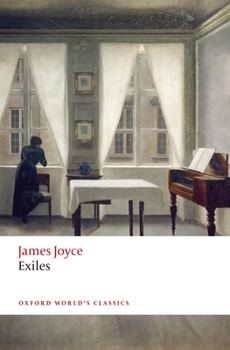Exiles
Select Format
Select Condition 
Book Overview
'That is my fear. That I stand between her and any moments of life that should be hers...' Set against the backdrop of the Home Rule Crisis of 1912, Exiles is James Joyce's only surviving play. It tells the story of writer Richard Rowan and his common-law wife Bertha, characters drawn from Joyce's own life with Nora Barnacle. After a decade of absence from Dublin, Richard and Bertha have returned home from Rome, still unmarried,...
Format:Paperback
Language:English
ISBN:0198800061
ISBN13:9780198800064
Release Date:February 2021
Publisher:Oxford University Press, USA
Length:192 Pages
Weight:0.56 lbs.
Dimensions:0.6" x 5.0" x 7.6"
Customer Reviews
1 rating
Insights into Joyce's life through his only dramatic work
Published by Thriftbooks.com User , 16 years ago
Worth a few hours perusal, as it's doubtful you'll see it on stage. Often relegated to the back of the Joycean shelf for its protagonist who resembles a nearly identical profile to his maker, nonetheless the play has its appeal as a portrait of the artist post-Stephen Dedalus. Written ten years after Bloomsday and the flight into exile by him and Nora, Joyce presents an update on his earlier portrayal of the young Irishman determined to turn his back on his mother, his homeland, and his faith. The more you know about Joyce and Nora, when he returned to Ireland in 1909 to be consumed with jealousy by rumors that she had been unfaithful to him with Joyce's old friend Vincent Cosgrave, and then in 1911-12 when Joyce confronted Roberto Prezioso in Trieste, accusing him of trying to seduce Nora, the more you may find this three-act play, written in 1914, intriguing. Certainly it's in the style of Ibsen, and generally as a minor work has been regarded of interest more for its insights into the mentally tortured artist, Richard (or "Dick") Rowan, but the play moves along efficiently, if a bit melodramatically and wordily. The action takes place over two days, and compresses as you'd expect much about the roles of artists, exiles, and lovers as the new century's own franker treatment of infidelity and its aftermath generate, beneath the dramaturgical machinations that do creak about, surprisingly moving moments of truth. Doubt and betrayal, the challenge of defying the bonds of sexual monogamy, aesthetic truth vs. job security, the benefits and the costs of an "open relationship"-- all contribute contemporary themes that for this era had begun to enter Irish theatre as they already had influenced (back to Ibsen) many contemporary Continental and British plays. One wonders about the hometown reaction if Yeats had not rejected it (it wasn't an Irish folk drama) for the Abbey in August 1917! Reading the play, observers today, informed as we are by the life of the writer and his own tensions in love and vocation, can see how Joyce in the guise of Richard controls other characters, like it or not. Joyce's own guilty conscience in his alter ego of Richard dominates. Robert, Bertha, and especially Beatrice all revolve around the approval of Richard. Bertha & Robert make an appealing pair, in my opinion; their earthiness makes them more down-to-earth for our tastes, while Richard, unless acted well, may not escape priggishness beneath the attitude of a liberated modern freethinker. He, despite his hesitancy, rules this domestic roost. (Not much is even thinly disguised when it comes to this figure and his unmarried companion-- they have returned to Dublin after nine years in Rome.) Even if Richard is more of a stand-in for his creator, the "authorial fallacy" aside, the drama does enrich your understanding of Joyce in his own separation from not only Ireland but conventional moral standards and familial support. It's rarely performed. Earlier versions,





